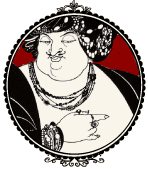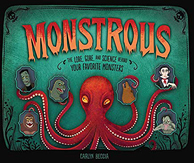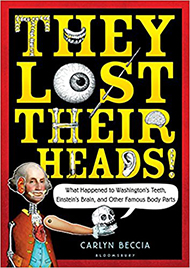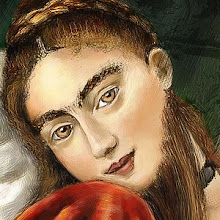In 1548, Henri II and his newly raised mistress Diane de Poitiers, the Duchesse of Valentinois, were making their official entrance into Lyons. (His wife, Catherine de Medici was to arrive the next day after Diane.) The people of Lyons pulled out all the stops to honor Diane plastering the city with references to the Goddess Diana and her black and white colors. A tourney followed with ladies tokens wrapped around lances, trumpets blazing and the chivalric ideals that had not yet faded into story books.
Enter one lithe knight waving a banner with the motto Belle a Soi (Beautiful to Oneself) who had had a particular good day breaking lances and beating the competition for Diane de Poitiers’ attention. (No one really cared about impressing the queen.) Diane and Henri then requested an interview with this valorous knight, but when the knight lifted his visor, a gasp admited from the crowd....out tumbled the golden hair of Louise Labe.
Louise Labe was a multi-talented heroine, horsewoman, archer, dancer, singer, musician and even martial artist. Oh and she could also belt out Petrarchan verse with the steamy rocker poise of Pat Benatar in an 80s MTV video. Daughter and wife of a ropemaker, this lion-hearted poet raised herself out of an illiterate background and shattered the patriarchal mold with her distinct battle cry for women to, “raise their minds slightly, above their falstaffs and bobbins”. (1)
In love, Louise let out a more fervent battle cry writing lyrical sonnets in Italian and French. One of my favorites:
Sonnet IV - When Love Arrives
When Love arrives, I hide myself away,
Though filled by burning torments of desire,
That scorch and sear and scar my breast with fire,
And flames devour my heart both night and day.
O how I feel the harsh travails of Love!
The wounds and devastating dreams of death
Descend on me whenever I draw breath,
And so I sigh although I make no move.
The more Love comes, the more I am besieged.
I gather up my forces, yet I fear
The crack in my defenses may be fatal.
O archer Love, who scorns both gods and mortals,
You draw your bow and aim your shafts for all,
Then stab our hearts despite our fortress walls.
Louise was born between 1515 and 1524 at Parcieu en Dombes near Lyon, a haven for writers and humanist thinkers. Around 1543, Louise married a doting sugar daddy who afforded her a life of luxury and the freedom to follow her artistic pursuits. In Lyons, she opened up an intellectual salon to which suitors flocked to hear her coo, “As long as I can pluck the lute, I try. To sing about your charms in my refrain. As long as I can think, my fevered brain. Is burning with an ardent zeal. I cry. In 1555, her heady Oeuvres were printed by the renowned Lyonnais printer Jean de Tournes and became a best seller.
Louise died after 1566, probably due to plague. After her death, detractors couldn’t wrap their jaundiced minds around a woman publishing such passionate poetry. In 1584, John Calvin denounced Louise as a courtesan and whore and she became known as "la Belle Cordière" (the beautiful ropemakers wife). In 2006, professor and author Mireille Huchon argued that Louise Labe’s poetry was really written by the men who frequented her intellectual circle - Maurice Scève, Olivier de Magny, Claude de Taillemont, Jacques Peletier du Mans, Guillaume des Autels, and others, and by the publisher Jean de Tournes.
I confess that I have not read Huchon’s book (because it is in French and my French ends with ordering my Café au Lait) but her poems seem far too consistent to be written by a group of ghost writers and forgive me for being so naïve… but they just don’t sound like the work of a man. Plus, Jean de Tournes published other works by female writers including Marguerite de Navarre's Marguerites de la Marguerite des Princesses (1547) and far more caustic feminist tracks like Franqois Habert's Nouvelle Iuno, Nouvelle Pallas, and Nouvelle Venus (1545, 1547).
Debate still continues on Louise Labe's life as a poet, but she won't be the first Renaissance lady reduced to sex pot over intellectual siren. Perhaps Louise knew better than anyone when she wrote, "I see my fate, and it’s a bitter pill."
Notes:
(1) p.411 Rigolot.
Sources and Further Reading
Louise Labé and the "Climat Lyonnois", François Rigolot, The French Review, Vol. 71, No. 3 (Feb., 1998), pp. 405-413, American Association of Teachers of French.
M. Wilson, Katharina. Women writers of the Renaissance and Reformation, Athens, Ga.: University of Georgia Press, 1987.
Louise Labe's poetry
Enter one lithe knight waving a banner with the motto Belle a Soi (Beautiful to Oneself) who had had a particular good day breaking lances and beating the competition for Diane de Poitiers’ attention. (No one really cared about impressing the queen.) Diane and Henri then requested an interview with this valorous knight, but when the knight lifted his visor, a gasp admited from the crowd....out tumbled the golden hair of Louise Labe.
Louise Labe was a multi-talented heroine, horsewoman, archer, dancer, singer, musician and even martial artist. Oh and she could also belt out Petrarchan verse with the steamy rocker poise of Pat Benatar in an 80s MTV video. Daughter and wife of a ropemaker, this lion-hearted poet raised herself out of an illiterate background and shattered the patriarchal mold with her distinct battle cry for women to, “raise their minds slightly, above their falstaffs and bobbins”. (1)
In love, Louise let out a more fervent battle cry writing lyrical sonnets in Italian and French. One of my favorites:
Sonnet IV - When Love Arrives
When Love arrives, I hide myself away,
Though filled by burning torments of desire,
That scorch and sear and scar my breast with fire,
And flames devour my heart both night and day.
O how I feel the harsh travails of Love!
The wounds and devastating dreams of death
Descend on me whenever I draw breath,
And so I sigh although I make no move.
The more Love comes, the more I am besieged.
I gather up my forces, yet I fear
The crack in my defenses may be fatal.
O archer Love, who scorns both gods and mortals,
You draw your bow and aim your shafts for all,
Then stab our hearts despite our fortress walls.
Louise was born between 1515 and 1524 at Parcieu en Dombes near Lyon, a haven for writers and humanist thinkers. Around 1543, Louise married a doting sugar daddy who afforded her a life of luxury and the freedom to follow her artistic pursuits. In Lyons, she opened up an intellectual salon to which suitors flocked to hear her coo, “As long as I can pluck the lute, I try. To sing about your charms in my refrain. As long as I can think, my fevered brain. Is burning with an ardent zeal. I cry. In 1555, her heady Oeuvres were printed by the renowned Lyonnais printer Jean de Tournes and became a best seller.
Louise died after 1566, probably due to plague. After her death, detractors couldn’t wrap their jaundiced minds around a woman publishing such passionate poetry. In 1584, John Calvin denounced Louise as a courtesan and whore and she became known as "la Belle Cordière" (the beautiful ropemakers wife). In 2006, professor and author Mireille Huchon argued that Louise Labe’s poetry was really written by the men who frequented her intellectual circle - Maurice Scève, Olivier de Magny, Claude de Taillemont, Jacques Peletier du Mans, Guillaume des Autels, and others, and by the publisher Jean de Tournes.
I confess that I have not read Huchon’s book (because it is in French and my French ends with ordering my Café au Lait) but her poems seem far too consistent to be written by a group of ghost writers and forgive me for being so naïve… but they just don’t sound like the work of a man. Plus, Jean de Tournes published other works by female writers including Marguerite de Navarre's Marguerites de la Marguerite des Princesses (1547) and far more caustic feminist tracks like Franqois Habert's Nouvelle Iuno, Nouvelle Pallas, and Nouvelle Venus (1545, 1547).
Debate still continues on Louise Labe's life as a poet, but she won't be the first Renaissance lady reduced to sex pot over intellectual siren. Perhaps Louise knew better than anyone when she wrote, "I see my fate, and it’s a bitter pill."
Notes:
(1) p.411 Rigolot.
Sources and Further Reading
Louise Labé and the "Climat Lyonnois", François Rigolot, The French Review, Vol. 71, No. 3 (Feb., 1998), pp. 405-413, American Association of Teachers of French.
M. Wilson, Katharina. Women writers of the Renaissance and Reformation, Athens, Ga.: University of Georgia Press, 1987.
Louise Labe's poetry













3 comments:
Ooh, what a cool story. Thanks for sharing it with us.
She sounds like my kind of girl! The definition of blond bombshell!
What an amazing story -- so cinematic!
Post a Comment